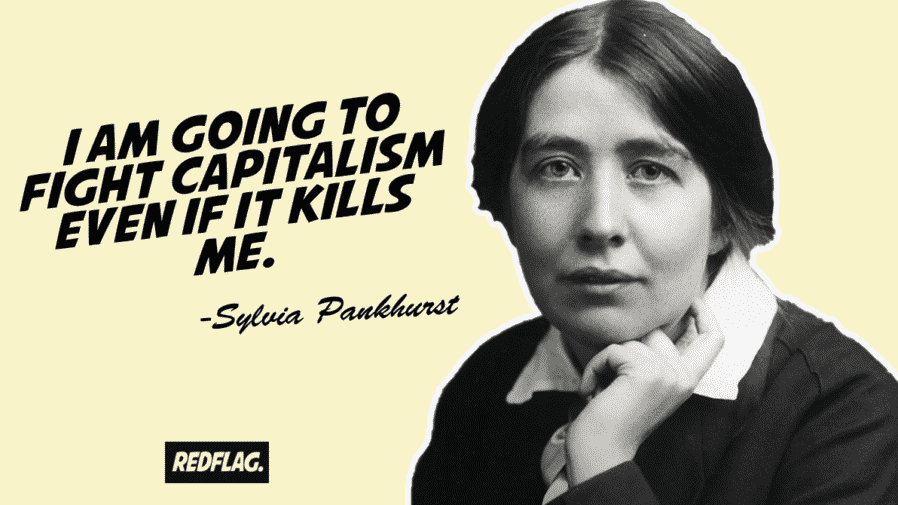

Sylvia Pankhurst (1882 –1960) was a formidable figure; an internationalist and anti-imperialist, an anti racist, and for a period a revolutionary communist. But it is as a tireless fighter for the emancipation of women that she is best remembered. At the centre of this work, she dedicated herself to the self-organisation and activity of working class women.
Though active in the suffragette movement from its inception (the Women’s Social and Political Union, WPSU), which she founded with her mother and sister, when she moved to the East End of London,Sylvia came to understand that the struggle for the emancipation of women did not end with the vote.
She helped found the East London Federation (ELF) and fought within it “not merely for votes but towards an egalitarian society – an effort to awaken the women submerged in poverty to struggle for better social conditions and bring them into line with the most advanced sections of the movement of the awakened proletariat.”
The ELF emphasised self-emancipation in the most practical of terms – the women themselves coordinated vital services in the poverty stricken streets and slums, setting up cost-price restaurants, a nursery, a toy factory to provide work, medical clinics for women and children.
Organising against the impoverished and unjust conditions of this part of London, Sylvia recognised that the self-emancipation of working class women was fundamental to the wider struggle for social and economic freedom for working people, that the liberation of women was part of the struggle of the working class itself.
Sylvia and her comrades wanted women not to be submissive and grateful for charity dispensed by the fine ladies of the upper classes – but to seize control of and organise their own lives; to fight for themselves and so fight collectively. The ELF undertook all this work alongside publishing the Women’s Dreadnought, a weekly newspaper, as an essential organ for the dissemination of socialist, anti-imperialist ideas.
The Women’s Dreadnought and ELF would be instrumental in building working class opposition to World War One. Whilst the eruption of the war saw her mother Emmeline and sister Christabel quickly halt the WSPU fight for women’s suffrage, throwing their lot in with ferocious patriotism and unreserved support for the war aims of British ruling class, Sylvia was wholeheartedly committed to fighting against the imperialist war, for socialism, and for the self-emancipation of women.
She worked within the ELF to convince working people that the war was not fought for their interests – that there must be a workers’ opposition to the war. The deaths and terrible injuries of their husbands, their own further impoverishment convinced increasing numbers that Sylvia was right.
Via the Women’s Dreadnought – renamed the Workers’ Dreadnought in July 1917 – Sylvia was crucial in reporting the Easter 1916 Rising in Dublin and defending its martyrs like James Connolly, in disseminating news of the Russian Revolution as it unfolded and finally, building support in Britain for Bolshevism. This activity in wartime put her and her supporters at risk of arrest, or bans of the Dreadnought. Yet the paper continued to unrepentantly battle for socialism and internationalism.
As the war continued and the ELF continued to move towards the left, asserting broader political positions, it would rename itself the Workers’ Suffrage Federation (1916) and then the Workers’ Socialist Federation (1918) would become the first group in Britain to affiliate to the Communist International.
Sylvia Pankhurst remained a socialist and anti-imperialist for her whole life. But it was during the turbulent and revolutionary years of 1910-20 in which she showed to the full her indomitable character and set an example to follow for future fighters for women’s liberation and socialism.